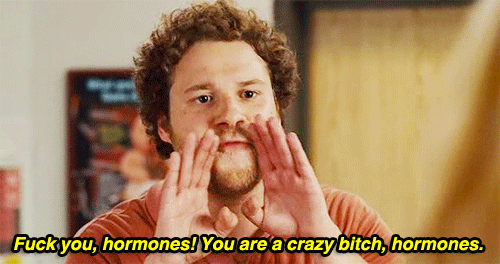3 Random Things Your Pubic Hair Reveals About You (Who Knew?)
Read this before you grab your razors.
 WeHeartIt
WeHeartIt Waxing, trimming, shaving, choosing to go au natural—no matter what you do with your pubic hair, one thing is true: we all have opinions on what our hair down under should look like. The obsession has sparked numerous myths and insecurities about the best way to groom.
But have you ever stopped to wonder what your pubic hair says about your health? We did, so we talked to top gynecologists to get the answer.
1. You're getting older.
OK, so maybe this isn't something you need your pubic hair to tell you, but you can expect your pubes to change as you age, especially once you hit menopause. "After menopause, there's a decrease in regrowth of overall body hair," says Raquel Dardik, MD, a gynecologist at the Joan H. Tisch Center for Women's Health at NYU Langone Medical Center. And that includes your pubic hair.
It won't just thin as you age, either. Just like the hair on your head, your pubic hair will start to gray, according to Dardik. "It's a normal aging process," she says.
2. You need to check your hormones.
Hormones can be your best friend or your worst enemy. When they're all in order, they regulate everything from your immune system to your mood. But when they're out of sync, hormones can make you gain weight, feel exhausted, and grow excessive amounts of hair—and that includes in your pubic area. So if your hair down there is going haywire, it might be worth getting your hormones checked.
Ovarian or adrenal gland tumors that secrete testosterone could be causing excess hair growth, according to Cheryl Iglesia, MD, chair of patient education at the American Congress of Obstetricians and Gynecologists. But growing more pubic hair won't be your only symptom. Extra testosterone will also show up as hair growth in other places—like your chin or sideburns—as well as acne, thinning of the hair on your head, and a deeper voice.
Hair growth can also be caused by certain medications or medical conditions like polycystic ovary syndrome, Dardik says. If you're noticing any symptoms, head to a gynecologist to check your hormone levels.
3. You need to lay off the razor.
Just two years ago, the New York Times declared that the natural look was back in for pubic hair. But a recent study finds that most women didn't get the memo—about 84% of women reported at least some pubic hair grooming.
While there's nothing wrong with that (what you do with your body is up to you), shaving or waxing can certainly lead to some problems—if you don't do it well. Those painful, swollen red bumps? Those are ingrown hairs. Shaving your vulva is more likely to result in ingrown hairs than shaving your legs because the hair is so coarse and thick, Dardik says. And excess dead skin around the area will make it worse.
So if you're going to shave or wax, Dardik suggests using an exfoliator in the shower to remove dead skin cells.
More content from Prevention:




